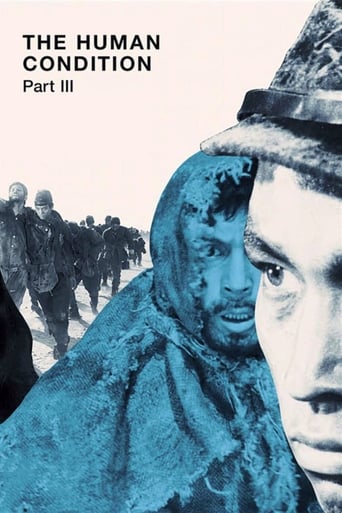Gerard Hosier
This trilogy was a grueling and rewarding. It was chilling to watch but I persevered. It was about the conflict between nationalism and the individual struggling for humanism. If you transfer yourself to post WW2 Japan you could see how powerful this film was. It was necessary for the soul searching that was to heal the results of the war.It is as important today as it was then.This trilogy affected me deeply after watching it.There is hardly a frame in the ten hours that does not have any sub-text associated with it.The ten hour film format has some merits maybe it will catch on.
Claudio Carvalho
The Japanese troops are defeated by the Soviets and Kaji (Tatsuya Nakadai) heads with three survivors to South Manchurian expecting to meet his wife. Along their crossing through the enemy line in the Manchurian land, other Japanese survivors join Kaji's group, but they need to fight against the Chinese militias and the Soviets.When they reach a Japanese village with women and one old man, a militia arrives in the place and Kaji and his men surrender to the Soviet to spare the women. The POWs are sent to a labor work camp and Kaji sees no difference between the treatment of the Japanese fascists and the Soviet communists, in which principles Kaji believed. He decides to escape from the camp to meet his beloved Michiko again."The Human Condition – Parts V & VI" is the last sequel of the heartbreaking anti-war masterpiece by Masaki Kobayashi. The story is impressively realistic and magnificently shot with top-notch camera work, giving the sensation of a documentary. I have seen many powerful movies about war, such as "Der Untergang", "Taegukgi hwinalrimyeo", "La Battaglia di Algeri", "Paths of Glory" and "Apocalypse Now" among others. But "The Human Condition" is certainly the most scathing antiwar movie that I have seen and I did not feel the 574 minutes running time in a black-and-white movie spoken in Japanese, Mandarin and Russian with English subtitles. It is impressive to see the treatment spent by the fascist Japanese soldiers for the rookies and how Kaji grows-up and learns how his idealistic concept of communism is shattered when he becomes a POW and swaps his initial position of supervisor to the one of prisoner. The hopeless conclusion fits perfectly to this masterpiece and shows that in times of war, people are far from the condition for being human to survive. My vote is ten.Title (Brazil): Not Available
holytrousers
anyone who is seriously interested in understanding what's wrong with the "human" should watch this excellent piece of art. Tatusuya nakadai is delivering here an astonish performance.Kobayashi is definitely one of the greatest directors and offers precision and coherence to this trilogy. Music is obviously an tremendous emotional experience. There is no necessity to write much, the movie speaks for itself as long as one understands the movements and rhythms conveyed through the subtle evolution of the main character. A long trilogy worth watching till the end in the vein of harakiri (seppuku). PS. understanding our history seems to be of great importance, especially in the actual political context of unrest, what happened and is happening in the arab world is a very important issue, violence unfortunately still prevails.abolishing authority of any kind (y compris nationalism, religions, traditions, ego etc.) seems the only way out.
MartinHafer
This is the third film in "The Human Condition" trilogy--a series of films that follow the very idealistic Kaji through WWII. At first, he believes strongly in the goodness and value of ALL people--putting him at odds with the xenophobic Japanese who see non-Japanese as subhuman. In the first film, Kaji is sent to oversee production at a forced labor camp where his humanitarian treatment of prisoners runs afoul of the militarists. By the end of the film, Kaji is not only removed from this job but inducted into the military.In the second film, he's in boot camp for much of the film and is frequently brutalized for his socialist views. By the end of the episode, it's the final days of the war and most of his unit is wiped out by Russian troops.Here in the third film, it picks up with Kaji and two other soldiers wandering about--trying to find food and civilization. Along the way, they meet up with other Japanese on the run and through the course of the film, most of the Japanese lose their humanity--thinking only of themselves and their baser instincts. However, Kaji is STILL an idealist--but he's finding it harder and harder to stick to these values as those around him degenerate like animals.Unfortunately, after struggling with hunger and exhaustion to try to find his way home, Kaji and his men are captured by the Russians and are sent to a work camp. There, in an ironic twist, Kaji learns firsthand what his workers in the first movie experienced. He's beaten, starved and treated like dirt. His socialist philosophy is finally broken when he realizes that Stalinist Russia is NOT a friend to the people--and it sucks just as much as any other lousy nation. He then escapes, wanders about and dies! Ultimately, the three films are about 10 hours of length and are an indictment of both the Japanese militarism as well as debunking the notion that humanity is universal. No, instead, war is useless and folks degenerate to their basest instincts. It's all very, very depressing and jaded--which isn't the least bit surprising for Japan during the 1950s--when lots of other great anti-war films debuted about the same subject matter--such as "Burmese Harp" and "Fires on the Plain". "The Human Condition" is great for its thoroughness and style, though I think the other two films are better since they are more concise--and, if anything, MORE negative in their depiction of war. Well worth seeing---just make sure you have a HUGE block of time to see it.



